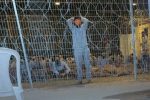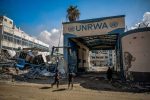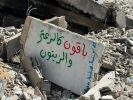Palestinian Resistance in the Gaza Strip decided to retaliate to the Israeli “assassination” of Sheikh Khader Adnan after 86 days of hunger strike inside Israeli occupation jails. They said in a joint statement that they would “turn the occupation’s daylight to darkness”. Then in the morning they fired three rockets towards the Israeli settlements in the south of Israel.
Immediately the Israeli security cabinet headed by Prime Minister Benjamin Netanyahu convened and decided to retaliate but the Palestinian Resistance ignored the Israeli threats and fired more rockets towards the illegal Israeli settlements paralyzing the life of the Jewish settlers who rushed to shelters.
The Palestinian Resistance including all the Palestinian factions continued firing rockets causing anger among the Israelis over the intensive fire and the delayed response. At night as usual the Israeli army launched a series of airstrikes and artillery bombings targeting several farmlands and empty areas across the besieged Gaza Strip causing one death and five injuries among civilians.
Later on it was revealed that Israel had been involved in ceasefire talks with the Palestinian factions through Egypt Qatar and the United Nations before the start of its response to the Palestinian rockets. Then to persuade its citizens that it is still maintaining deterrence against the Palestinian Resistance Israel claims that the targeted farms and empty areas are arms factories. However the most militarized area of these targets is a training base with a toilet and one or two-room facilities.
What happened clearly reflects the eroded Israeli deterrence against the Palestinian Resistance in Gaza. Israeli journalist Meron Rapaport told me that the reason behind the weak Israeli response to the launch of over 100 Palestinian rockets is that Israel and the Islamic Jihad “does not want a war now”.
Every time when Israel launches an offensive on Gaza it starts it and escalates the situation with the Palestinian Resistance prompting its retaliation. The Palestinians in the besieged Gaza Strip have never been happy with having a war with Israel because they know that Israel is a nuclear power has the backing of the US and the international community and does not have any war ethics.
Ron Ben-Yishai a veteran Israeli war correspondent wrote to Ynet news that Israel did not want a major offensive in Gaza fearing international backlash. “Major Israeli operation in Gaza or even a significant bombing campaign there would help Palestinians drag Israel to the UN Security Council for condemnations supported by Russia China and perhaps even the US.”
He also expected the Israeli government opted to a limited response to the rockets fired from Gaza due to the death of Sheikh Khader Adnan in Israeli jails. He wrote that the Israeli government would have thought this would be enough for the lack of international backing for a major Israeli offensive on the Gaza Strip.
Along with many Israeli writers Ben-Yishai referred to the internal rift in Israel which is a result of the judicial overhaul planned by Netanyahu’s government. The Israeli analysts and writers expected that the Israeli public and officials would expect Netanyahu would have worked to distract them from his plans to weaken the judiciary through going on a wide-scale offensive in Gaza.
“Netanyahu was to order an extensive military offensive he would be accused of attempting to silence public opposition to him that has brought hundreds of thousands of Israelis to weekly demonstrations for over 17 weeks and might even cause reservists to refuse to show up when called” Ben-Yishai.
A number of Israeli writers stated that the internal political and social rift is one of the most effective reasons that pushed Netanyahu not to go for a major offensive in Gaza referring to the distrust between the generals and commanders of the army and intelligence services. They cited the widespread protests among the different army ranks against Netanyahu’s planned judicial reforms.
If the army and intelligence services put their differences behind during a possible war Netanyahu would have remained afraid of the lack of public support as he sees hundreds of thousands of Israelis taking to the streets calling for him to resign or refrain from his planned judicial reforms.
When there is a crisis in Israel the government and the opposition come together but currently the situation is completely different. The current opposition does not have any trust in Netanyahu and his government and an offensive on Gaza did not change the situation early in April.
Following a security briefing with Netanyahu on an offensive on Gaza on 9 April head of the opposition Yair Lapid said: “I arrived at the briefing with Netanyahu worried and I left even more worried.” Then he said about Ben-Gvir Netanyahu’s partner “We can’t have a TikTok clown who has lost the trust of the police and forces in the field managing things.”
If the Arabs in Israel revolted against Netanyahu in protest against his possible attack on Gaza like what happened in 2021 Netanyahu would have enough trust in Ben-Gvir that he would not be able to lead the police deterring the protests. Ben-Gvir is being accused of triggering confrontations with the Palestinians.
Military correspondent for Israeli Hayom Lilach Shoval referred the lack of strong action against Gaza to the loss of regional support as the Middle East leaders who used to seek Israel’s consent in order to have it open the gate of the White House are no longer interested in the United States at all.
“The regional players have already come to the conclusion that the Middle East is not a top priority for the current White House occupant who is keen to move forward with the extraction of the US. The fact that Saudi Arabia chose to make amends with Iran shows that it too understands that the US will not provide the solution regarding Tehran. Israel is concerned that countries that have publicly forged relations under the Abraham Accords with the Jewish state will follow Saudi Arabia and turn eastwards” Shoval said.
Israel is currently experiencing many political social economic and military crises that make this time not ideal to carry out a wide-scale confrontation with the Palestinian Resistance. It is not clear when the ideal time will come as Israel’s crises have been moving from bad to worse without any light at the end of the tunnel.
– Motasem A Dalloul is MEMO’s correspondent in the Gaza Strip.











